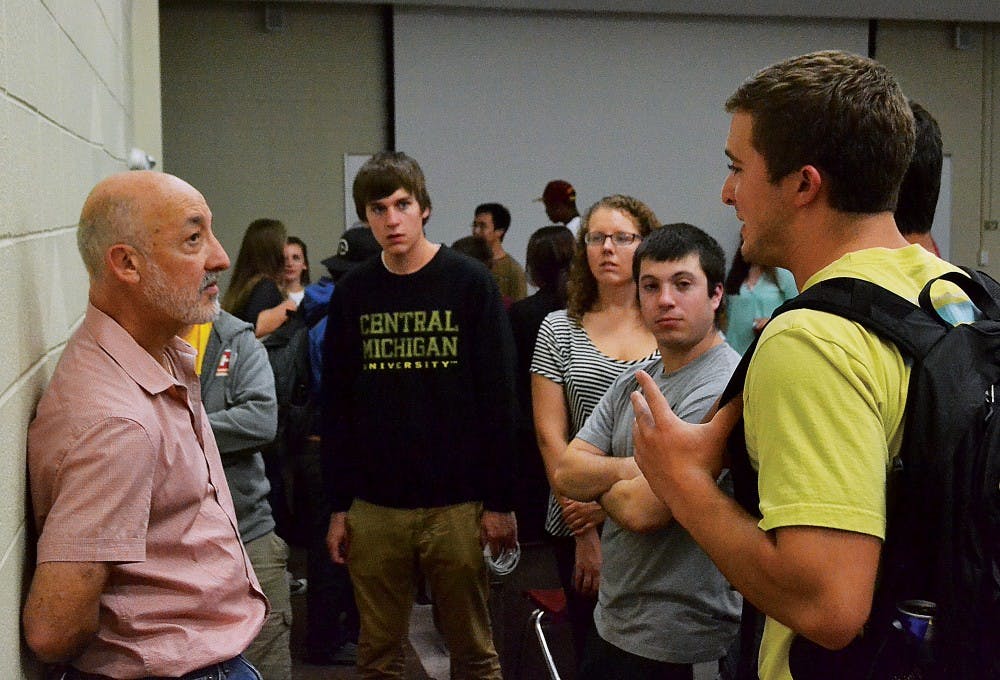Matthew Abel speaks on medical and responsible use of cannabis

For Cheboygan sophomore Ian Elliot, marijuana isn’t a recreational activity--it’s his medicine.
“Some of us need to use marijuana, myself included,” he said. “I am a seizure patient. To me, it does alleviate some of the symptoms that would cause me difficulties while going to CMU.”
As the president of Student Advocates for Medical and Responsible use of Cannabis, Elliot and other members of SAMRC hosted an event bringing attorney, Matthew Abel to speak on behalf of cannabis and the law Wednesday night.
Abel is a criminal defense lawyer with his own firm, Cannabis Counsel, which focuses on marijuana cases. He warmed up the audience with a few jokes and got the crowd laughing within the first few minutes.
“When we talk about cannabis, the term ‘Fire Up Chips’ has a new meaning,” he said.
Abel began explaining how he got started in his career and shared why he chose the career that he did.
“Luckily, I was able to make a career out of my hobby,” he said. “I originally thought working toward legalization of marijuana would be short term. We work hard and play hard. We take our jobs and clients very seriously.”
Abel’s discussion focused on how the law plays a role with the use of medical marijuana. He explained the differences between responsible and irresponsible use of cannabis and how it can affect those who choose to partake.
“It depends on the situation,” he said. “Some people function better with marijuana and some people do not.”
He also discussed the laws that surround owning and operating dispensaries, previous cases, licensing and politics. Abel said states that have legalized marijuana have had fewer crimes, as well as a 25 percent decrease in opiate deaths.
“If you get down to the statistics, cannabis has had a bad effect on society,” he said. “However, people who really want to smoke pot already are. Opiates will kill you, marijuana won’t.”
The event was a learning experience for, Recruitment Chair of SAMRC and Perry senior, Lisa Conine.
“I thought tonight was great; I got to learn more about what he does and how he feels about everything,” she said. “I think it’s cool how he includes humor so it doesn’t feel like a class.”
Learning more about the law is what stood out to Conine most.
“If college students aren’t educated on their rights, it’s really easy to get into trouble when you don’t know what your rights are,” she said.
Clarkston freshman Jon Pitts was most interested by the opiate death decrease in states that have legalized marijuana.
“It was really eye-opening to hear a lot of the facts that they presented. The 25 percent decrease in deaths from opiates was really interesting to learn about,” he said.
Hearing statistics and laws supporting marijuana intrigued Flint freshman Dylan Williams. Being able to discuss the use of cannabis in more legal terms was good to see, he said.
“Instead of hearing people talk about it, saying how great it is, there were actual statistics and law behind all of it,” he said. “I learned more about what you’re protected under by law, what you should say and what you shouldn’t say.”
Breaking stereotypes and stigmas are what many cannabis users, and activists like SAMRC, are focusing on recently.
“A lot of our students here are high achievers academically as well as with extracurricular activities outside of SAMRC,” Elliot said.
The stereotypes have been around for decades. Abel said the government has spent a lot of time and money pushing propaganda that involves cannabis.
“It takes a long time to end the propaganda,” he said. “There are a lot of people who still believe it. With the advent of the Internet and more access to information, people are understanding how crazy that propaganda was and how crazy it was to believe it in the first place.”
SAMRC provides many opportunities for students interested in the use and laws regarding medicinal marijuana.
“The real reason that we do this is not for the number of students that show up,” Elliot said. “If we can make enough of an impact on these professionals, then they’re going to turn around and carry that knowledge and understanding back to whatever their profession is, and that to us is a success.”



